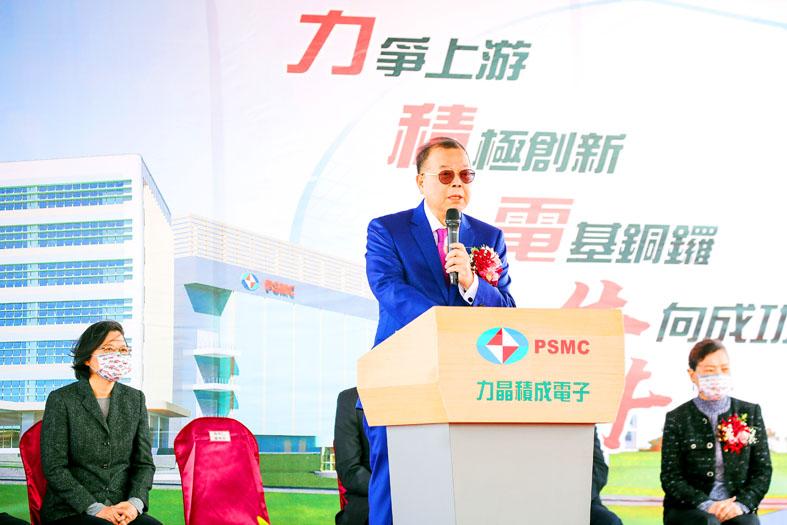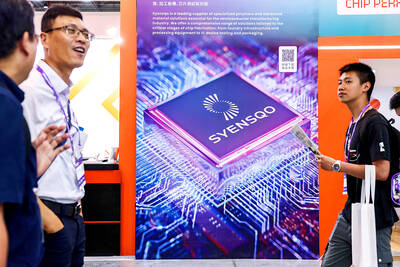Powerchip Semiconductor Manufacturing Corp (力積電), a power management IC supplier, expects to debut on the Taiwan Stock Exchange by the end of this year after shareholders yesterday approved the initial public offering.
The result of the vote indicates that the Powerchip group has emerged from woes caused by a severe industry slump after restructuring efforts, Powerchip chairman Frank Huang (黃崇仁) told the firm’s annual general meeting.
Powerchip in 2008 was spun off from Powerchip Technology Corp (力晶科技), a technology holding company.

Photo: I-Hwa Cheng, Bloomberg
Powerchip Technology, which started as a DRAM chipmaker, incurred debt of NT$120 billion (US$4.29 billion) because of an overcapacity-driven industry slump. It paid the debt back over the past few years.
Powerchip Semiconductor has a rosy business outlook for this year after transforming into a supplier of power management chips, image sensors and memory chips, given a persistent global chip crunch, Huang said.
“We are seeing an undersupply of memory and logic chips,” he said.
“That is why we started building a new plant at the Tongluo Science Park (銅鑼科學園區)” in Miaoli County, he added.
“Our capacity is fully booked for the whole of next year,” he said.
“Not a single wafer is left,” Huang said, dismissing shareholders’ concerns about another round of oversupply.
“It [a supply glut] is not likely to happen,” he said.
The new fab would have an installed capacity of 25,000 12-inch wafers per month in the first phase when it enters mass production in 2023, Powerchip Semiconductor said.
The company plans to invest NT$278 billion over the next 10 years to quadruple its capacity to 100,000 wafers a month, the company said.
The capacity expansion plan comes as Powerchip Semiconductor has had difficulty keeping up with orders, it said.
Given the demand, Powerchip Semiconductor president Brian Hsieh (謝再居) said that revenue would grow 30 to 40 percent this year from last year.
It made NT$45.68 billion last year.
Net profit growth would be even faster, Hsieh said, adding that it is expected to be much better than last year, when Powerchip Semiconductor earned NT$3.81 billion, or earnings per share of NT$1.23.
For the whole of this year, the chipmaker expects quarter-on-quarter growth in revenue and net profit, he said.
The company expects gross margin to keep rising, perhaps surpassing local rival Vanguard International Semiconductor Corp (世界先進) in the near future, said Huang, citing price hikes.
Vanguard posted gross margin of 38.1 percent in the first quarter.
Powerchip Semiconductor did not disclose its first-quarter gross margin, but said that pretax profit was NT$2.57 billion.
Powerchip Semiconductor operates two 8-inch fabs and three 12-inch fabs, while Vanguard operates four 8-inch fabs.

SEMICONDUCTOR SERVICES: A company executive said that Taiwanese firms must think about how to participate in global supply chains and lift their competitiveness Taiwan Semiconductor Manufacturing Co (TSMC, 台積電) yesterday said it expects to launch its first multifunctional service center in Pingtung County in the middle of 2027, in a bid to foster a resilient high-tech facility construction ecosystem. TSMC broached the idea of creating a center two or three years ago when it started building new manufacturing capacity in the US and Japan, the company said. The center, dubbed an “ecosystem park,” would assist local manufacturing facility construction partners to upgrade their capabilities and secure more deals from other global chipmakers such as Intel Corp, Micron Technology Inc and Infineon Technologies AG, TSMC said. It

EXPORT GROWTH: The AI boom has shortened chip cycles to just one year, putting pressure on chipmakers to accelerate development and expand packaging capacity Developing a localized supply chain for advanced packaging equipment is critical for keeping pace with customers’ increasingly shrinking time-to-market cycles for new artificial intelligence (AI) chips, Taiwan Semiconductor Manufacturing Co (TSMC, 台積電) said yesterday. Spurred on by the AI revolution, customers are accelerating product upgrades to nearly every year, compared with the two to three-year development cadence in the past, TSMC vice president of advanced packaging technology and service Jun He (何軍) said at a 3D IC Global Summit organized by SEMI in Taipei. These shortened cycles put heavy pressure on chipmakers, as the entire process — from chip design to mass

People walk past advertising for a Syensqo chip at the Semicon Taiwan exhibition in Taipei yesterday.

NO BREAKTHROUGH? More substantial ‘deliverables,’ such as tariff reductions, would likely be saved for a meeting between Trump and Xi later this year, a trade expert said China launched two probes targeting the US semiconductor sector on Saturday ahead of talks between the two nations in Spain this week on trade, national security and the ownership of social media platform TikTok. China’s Ministry of Commerce announced an anti-dumping investigation into certain analog integrated circuits (ICs) imported from the US. The investigation is to target some commodity interface ICs and gate driver ICs, which are commonly made by US companies such as Texas Instruments Inc and ON Semiconductor Corp. The ministry also announced an anti-discrimination probe into US measures against China’s chip sector. US measures such as export curbs and tariffs